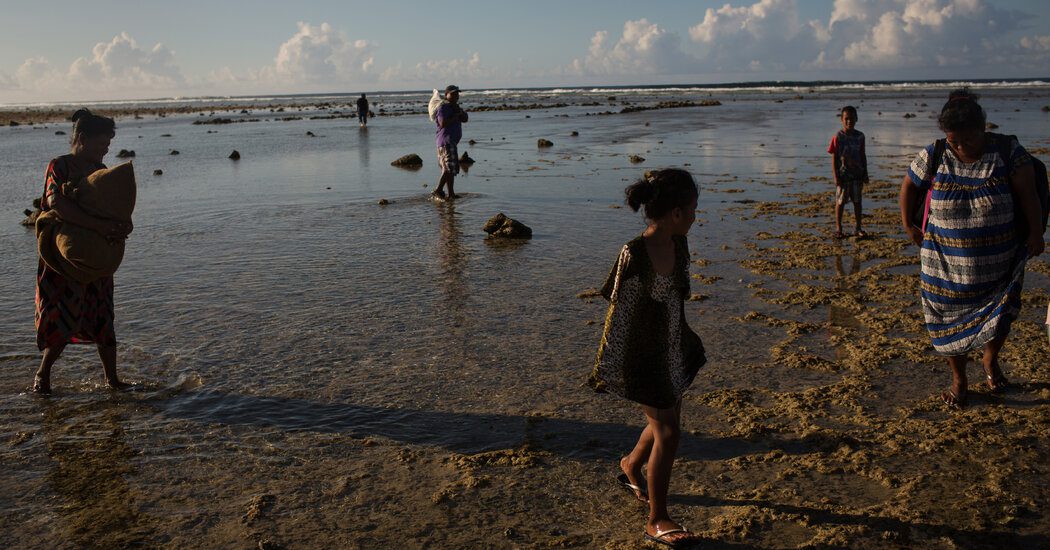Global Courant 2023-05-03 18:25:27
The golden sands of Bikini Atoll are laced with plutonium. The fresh water is poisoned with strontium. The coconut crabs contain dangerous amounts of cesium.
In the 1940s and 1950s, the US government used this coral reef, in the Pacific nation of the Marshall Islands, for nuclear weapons testing. Radioactive residues have rendered Bikini uninhabitable to this day, forcing those whose families once lived on the atoll to go into exile on a handful of other Marshall Islands and in the United States.
Recognizing the damage the tests caused, the U.S. government established two trust funds in the 1980s to help pay for healthcare in Bikinians, build housing, and cover living expenses. In 2017, following a campaign by Bikini leaders for more autonomy, the Trump administration announced that the government would lift withdrawal limits and stop controlling the main fund, then worth $59 million.
Six years later, there’s only about $100,000 left and the Bikini community is in crisis.
Anderson Jibas, the mayor of the municipality overseeing the displaced Bikini community, has made a series of questionable purchases on Bikini’s behalf, including a large tract of land in Hawaii and a fleet of new vehicles. He has defended some of the purchases as climate change investments, as necessary to support isolated Bikinians and as revenue-generating efforts.
Mr. Jibas has also acknowledged using money from the trust fund for personal expenses and has been accused by a top Marshall Islands official of receiving a bribe from an investment manager – a charge Mr. Jibas denies.
Now that the fund has almost been exhausted, the municipality’s approximately 350 employees are no longer paid. Monthly payments of about $150 each to the community’s 6,800 members — a vital lifeline that helped pay for food and rent among a population with high poverty rates — have been halted.
The emergency highlights the lasting effects of decades of US nuclear testing in the Pacific, including lingering questions about the US commitment to address that legacy, an undertaking complicated by pervasive fraud and mismanagement in the region.
“It is a disaster,” said Tommy Jibok, a former member of the Bikini council who challenged Mr Jibas in an election in 2019. “They told us we would sit and sleep with money. Look what is happening now. We sleep on nothing.”
In 1946, the United States relocated Bikini’s population of 167 to pave the way for nuclear testing that it said would “end all world wars.” It then left them virtually alone on a small, desolate island, where many nearly starved to death. In 1948, the islanders were relocated again.
Over 12 years, the United States tested 23 nuclear bombs in Bikini. In 1968, President Lyndon B. Johnson announced that the Bikinians would return home. But after scientists discovered that radiation levels remained dangerously high, in 1978 the United States evacuated the nearly 150 people who had chosen to go back. The following year, the Marshall Islands gained independence from the United States.
In 1982, the US government established a $25 million resettlement fund to clean up Bikini and support the population. In 1987, it created a second fund to make annual payments directly to Bikinians. A year later, it contributed another $90 million to the resettlement fund. US officials controlled the money and could veto withdrawals.
Bikini representatives argued that the resettlement fund contained too little money to remedy the atoll’s radioactivity. They instead used the money to support the exiled Bikinians.
But the Bikini leaders were frustrated by US officials’ refusal to release more than a few million dollars each year. The battle culminated in 2016 with the election of Mr Jibas, who pledged to take control of the resettlement fund. (The other fund is overseen by independent trustees.)
At a congressional hearing in 2017, Mr. Jibas explains that residents of Bikini “know much better than the intermediaries or distant agencies of the United States what it takes to make the lives of the displaced population more bearable.”
Douglas Domenech, Assistant Home Secretary at the time, announced that the Home Office would relinquish control of the resettlement fund to “restore confidence and make sovereignty mean something”.
Mr. Jibok, the former Bikini councilman, had a different interpretation: that US officials wanted to “wash their hands clean” of responsibility for Bikinians.
Whatever the motivation, the result was a rapid increase in council expenses under Mr. Jibas, from $7.6 million in 2016 to $25.7 million in 2018, according to audits of the time. Bank statements from Gordon Benjamin, a council attorney, show that the fund, worth $59 million in 2017, was just $100,041 in March of this year.
Many of the council’s purchases have been popular, including a small plane and two freighters to supply isolated Bikinians, as well as construction equipment to build protection from the rising seas that threaten low-lying Pacific islands due to climate change.
But there were also more questionable purchases: $4.8 million for 283 acres of land in Hawaii; $1.3 million for an apartment complex in Majuro, the capital of the Marshall Islands; and multiple new vehicles for the personal use of Bikini council members, according to Mr. Benjamin. Mr. Jibas also introduced a $100,000 annual “representation package” to fund his regular trips to the United States.
Mr. Jibas has said he wants to develop properties in Hawaii for rent or sale, but no development has yet taken place. The Majuro apartment complex was purchased as an investment property, but seems to be losing money so far.
Lani Kramer, a Bikinian who previously worked as a town councilor and now Mr. Jibas for mayor, said Mr. Jibas and councilors had used public funds for personal expenses. “They brought receipts for diapers and gum,” Ms. Kramer said. “Obviously it wasn’t for the people, it was for their own messages.”
The Bank Commissioner of the Marshall Islands, Mr. Jibas also charged with accepting $50,000 from a local bank manager who is being prosecuted on suspicion of unlawfully investing Bikini funds and money laundering. The Marshallese Auditor General did not respond to requests for comment about the allegations.
As of 2018, Mr. Jibas to disclose the council’s finances to the Auditor General of the Marshall Islands, prompting police to seize council documents in 2021. Late last month, an interior ministry spokesman said it had written to bank officials asking for information about the fund and to Mr Jibas requesting the council’s recent budgets.
That request came after Jack Niedenthal, an American expatriate who served as Marshallese health secretary, wrote a letter to the Department of the Interior warning of the depleted trust fund and asking the department to intervene. He was subsequently fired for violating diplomatic protocol by bypassing the Marshallese State Department and US Embassy.
Mr Jibas acknowledged in an interview that he occasionally used his representation pack to buy food and other items for his family, which he said councilors knew about and approved, but denied taking money from the bank manager.
Mr. Jibas said in the interview that he was trying to access the independently audited second fund, which now contains $28 million, to support the council’s spending.
According to Mr. Benjamin, as of October 2021, the trustees of that fund allowed the council to raise about $13 million to fund the expenditures, but reversed their position earlier this year and stopped all payments from the fund, including the regular subsistence payments to Bikini Bottom, to prevent further depletion. In the interview, Mr. Jibas said he also hoped to tap new US funding to supplement the main fund.
Earlier this year, the Biden administration pledged to provide the Marshall Islands with $700 million in one-time aid and continue to underwrite a large portion of the government’s budget. Under a treaty, the United States controls the country’s defense policy, which the US government says is crucial to countering China in the region. The aid has not yet been approved, leaving Bikinians’ future uncertain.
In a statement on behalf of Mr. Jibas said Mr. Benjamin that the mayor’s critics are not pushing the United States hard enough for more funding.
Mr Jibok, who as a council member opposed Mr Jibas’ attempts to gain control of the fund, said the United States had done little to make the Bikini community self-sufficient, leaving few financial guarantees.
“I didn’t think we were ready,” said Mr. Jibok, “because I knew we had nothing in house to control mismanagement or fraud.”








